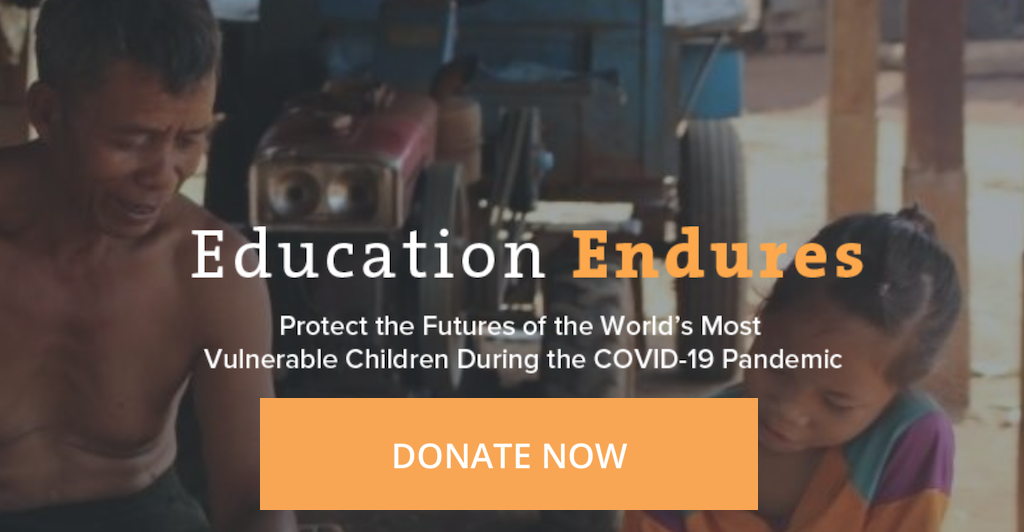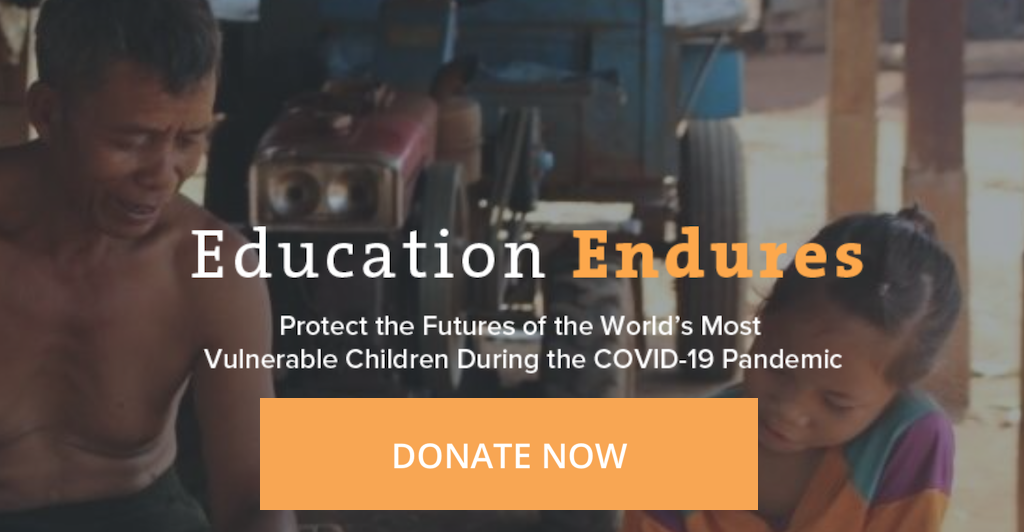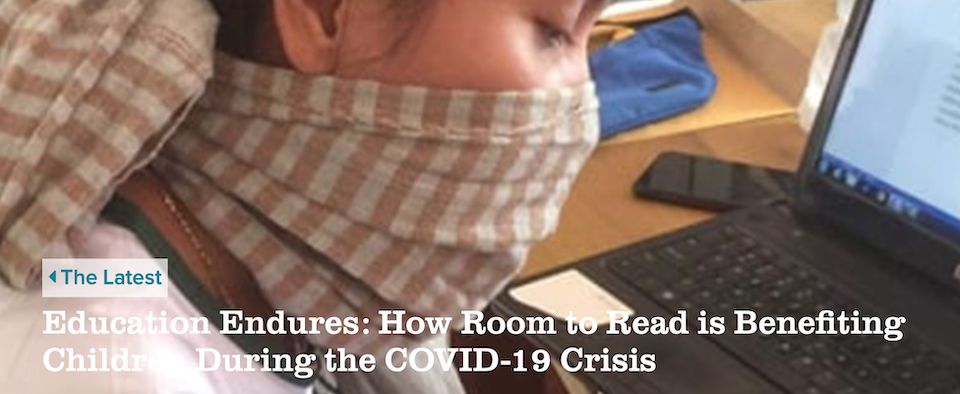
教育を持続させる:
新型コロナウィルス感染症危機の中で、どのようにルーム・トゥ・リードは子どもたちのサポートを行っているのか
ユネスコによると、世界では、これまで見たことのない大規模かつ広範囲な学校閉鎖が行われており [1]、その間、前例のない数の生徒が学校を休んでいるという。この大流行の中で、学習を促進することがこれほど緊急に必要とされていることはありません。最も困難な時代であっても、教育は決して奪うことのできないものです。教育は、それを受けるすべての人のために永続し、回復力と思いやりのある世代を生み出すことで、コミュニティを強化します。ルーム・トゥ・リードは、世界中のコミュニティで、子どもたちの教育が終焉を迎える危険にさらされないように活動を行っています。 ここでは、ルーム・トゥ・リードが生徒たちにどのようにサポートを行っているのか、その一部をご紹介いたします。
遠隔メンタリングセッション
私たちのプログラムのすべての国で、ソーシャル・モビライザー(女の子とメンターとなる女性)は女子教育プログラムを通じて支援を行っている女子たちとバーチャル・メンタリング・セッションを行い、少女の家族と連絡を取り合っています。このようなビデオチャットや電話による継続的な精神的サポートを行うと同時に、この時期に少女が学校を中退することがないようリスク管理しています。
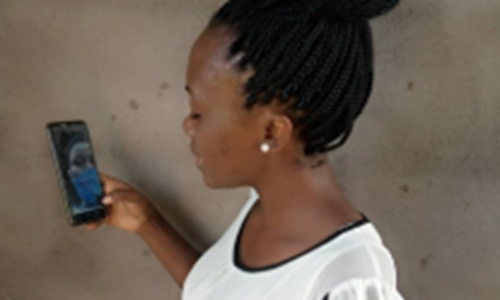
ラジオ放送による教育指導
スリランカ、ネパール、タンザニア、南アフリカでは、現地のラジオ局と提携し、読み書きの授業を放送しています。これらの放送の対象者としては、家庭で子どもの教育の面倒を見る親たちも含まれています。ユネスコによると、世界では75%の家庭がラジオを利用している、とのことです[2]。
また、タンザニアでは、タンザニア教育研究所と提携し、政府協賛のラジオの教育番組を使って、女子教育プログラムのライフスキル教育教材を放送しています。
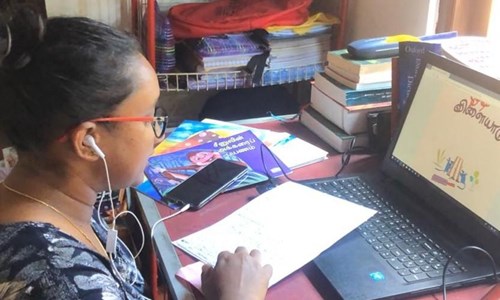
読み聞かせ動画
ネパールとラオスでは、識字指導のファシリテーターが、保護者、教師、学校の教員で構成されるオンライングループを組織し、生徒のための読書や教材について話し合っています。教師やスタッフは、読み聞かせのビデオを作成したり、子どもたちに読み聞かせをする際のヒントを集めたりして、オンライングループを通じて資料を提供しています。これらの読み聞かせはソーシャルメディアでも共有されており、全国の保護者や生徒が簡単にアクセスできるようになっています。
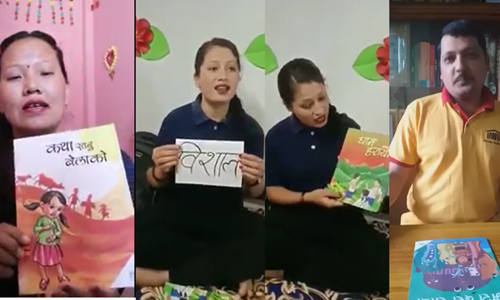
オンラインでの読書時間
ベトナムでは、教師たちが通常の図書室での読書時間のかわりに、バーチャルな読書時間を導入しています。このようなオンラインセッションでは、生徒は文字の読み書きを練習したり、先生やクラスメートと物語をシェアすることができます。また、子どもたちが本を介してつながる場を提供することで、生徒たちの遠隔学習活動への参加を促しています。また、読書会では、保護者と教師がお互いに質問をしたり、家庭での子どもの読書をサポートするための最善の方法について話し合ったりする機会にもなっています。
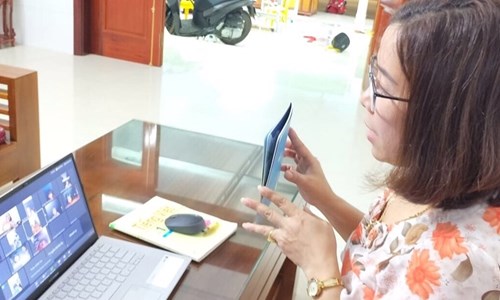
親のエンゲージメント
カンボジアでは、子どもたちが読書や識字活動に参加するためのヒントやガイダンスが記載された、保護者向けの短いビデオをリリースしました。チームはこれらのビデオをメッセンジャーアプリで共有しています。ビデオに加えて、識字教育プログラムのチームは、定期的に電話やメールで保護者をフォローアップし、進捗状況を確認したり、質問に答えたり、励ましの言葉を伝えたりしています。
また、ソーシャルモビライザーは、電話やビデオ通話、メッセンジャーを使って、新たに女子教育プログラムに参加する保護者との遠隔での歓迎会を実施し、自己紹介や女子教育プログラムの活動の仕組みを説明しています。
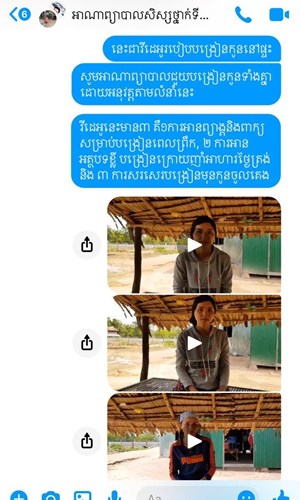
[1] UNESCO COVID-19 Impact on Education
[2] UNESCO Statistics on Radio
◆この困難な時期にも子ども達が継続して教育を受けられるよう、ご支援をお願いいたします。
寄付はこちらから:
https://give.roomtoread.org/Together2020
******************************************************
《Education Endures》
How Room to Read is Benefiting Children During the COVID-19 Crisis
According to UNESCO, an unprecedented number of students worldwide are currently out of school [1] during one of the largest and most widespread school shutdowns the world has ever seen. Amidst this pandemic, there has never been a more urgent need to facilitate learning. Even during the most challenging times, education is one thing that cannot be taken away — it endures for all who receive it, and strengthens communities by creating a generation of people who are resilient and compassionate. Room to Read is working in communities across the globe to ensure that no child is at risk of their education coming to an end. Here are some of the ways we continue to deliver educational resources to our students.
Distance Mentoring Sessions
Across all of our program countries, Social Mobilizers conduct virtual mentoring sessions with participants in our Girls’ Education Program and check in with the girls’ families. These video chats and phone calls provide ongoing emotional support, while also monitoring risks that may lead a girl to drop out of school during this time.

Educational instruction via radio broadcast
In Sri Lanka, Nepal, Tanzania and South Africa, we are partnering with local radio stations to broadcast literacy activities. These broadcasts include parents to support their children’s education at home. According to UNESCO, 75% of households globally have access to radio [2], so these broadcasts allow us to reach students who may not have computer or internet access.
In Tanzania, we are also partnering with the Tanzania Institute for Education to secure government-sponsored radio time for educational learning, in order to broadcast Life Skills Education materials from our Girls’ Education Program.

Read-aloud Videos
In Nepal and Laos, our literacy facilitators organize online groups of parents, teachers and school faculty to discuss reading and educational materials for their students. Teachers and staff are creating read-aloud videos, as well as gathering tips on reading aloud to children, and providing these resources through the online groups. These read-alouds are shared on social media as well, so they are easily accessible for parents and students across the country.

Online Reading Periods
In Vietnam, teachers are implementing virtual “reading periods” in place of the library periods students normally have during the week. These online sessions allow students to practice their literacy skills and to share stories with their teachers and classmates. They help keep students engaged in distance learning activities by providing a space for children to connect over books. The reading periods also give parents and teachers an opportunity to ask each other questions and discuss the best methods to support their children’s reading at home.

Parent Engagement
In Cambodia, our team developed short videos for parents with tips and guidance on how to engage their children in reading and literacy activities. The team shares these videos through messenger apps. In addition to these videos, our Literacy Program team periodically follows up with parents via calls and texts to check on their progress, answer questions, and provide encouragement.
Social mobilizers have also implemented remote welcome meetings with new Girls’ Education Program parents via phone call, video call or messenger to introduce themselves and explain the structure of the Girls’ Education Program activities.

[1] UNESCO COVID-19 Impact on Education
[2] UNESCO Statistics on Radio
To help children continue to access the stabilizing force of education during this turbulent time, click here to make a donation.
https://give.roomtoread.org/campaign/covid-19-urgent-appeal/c278379

